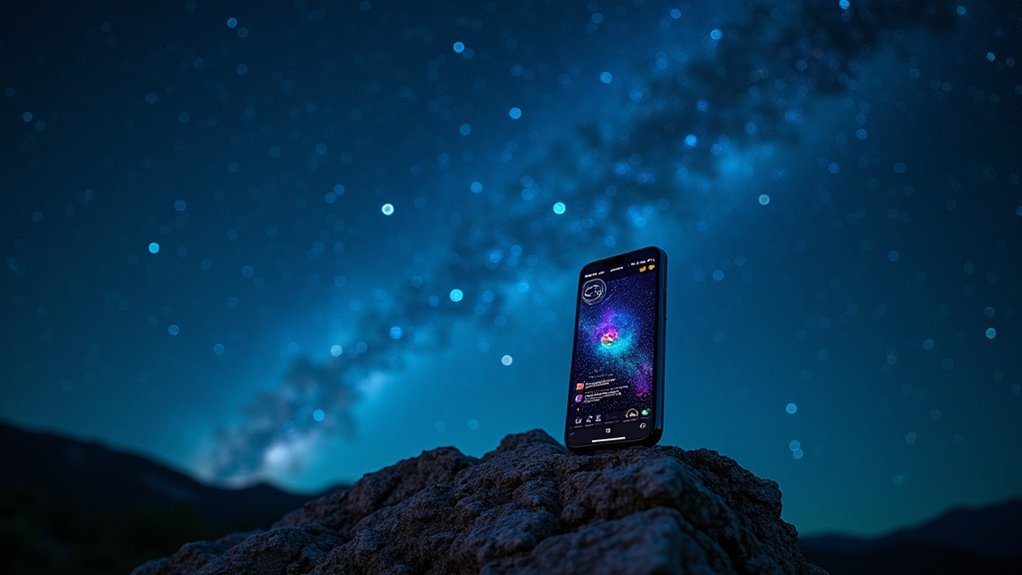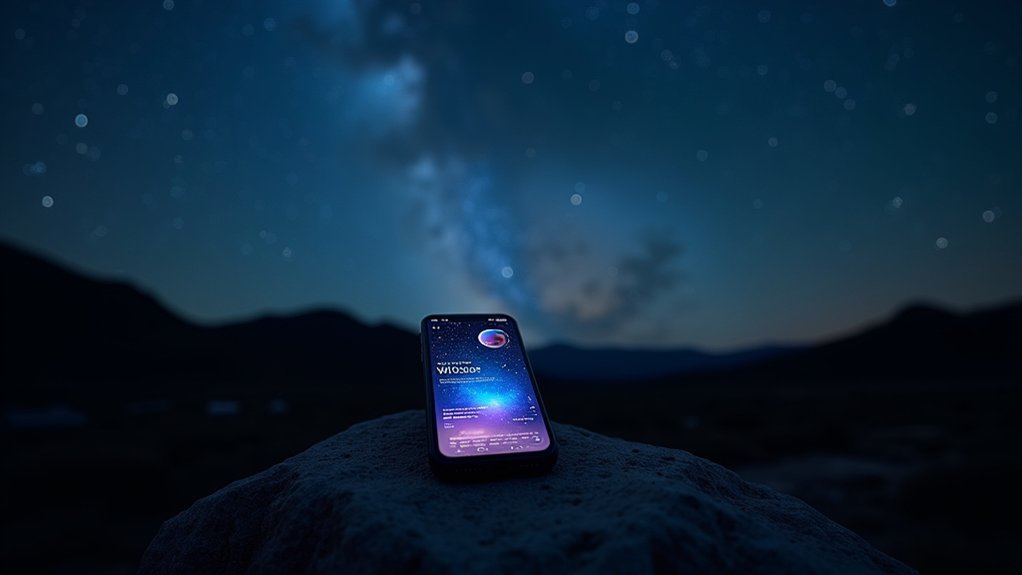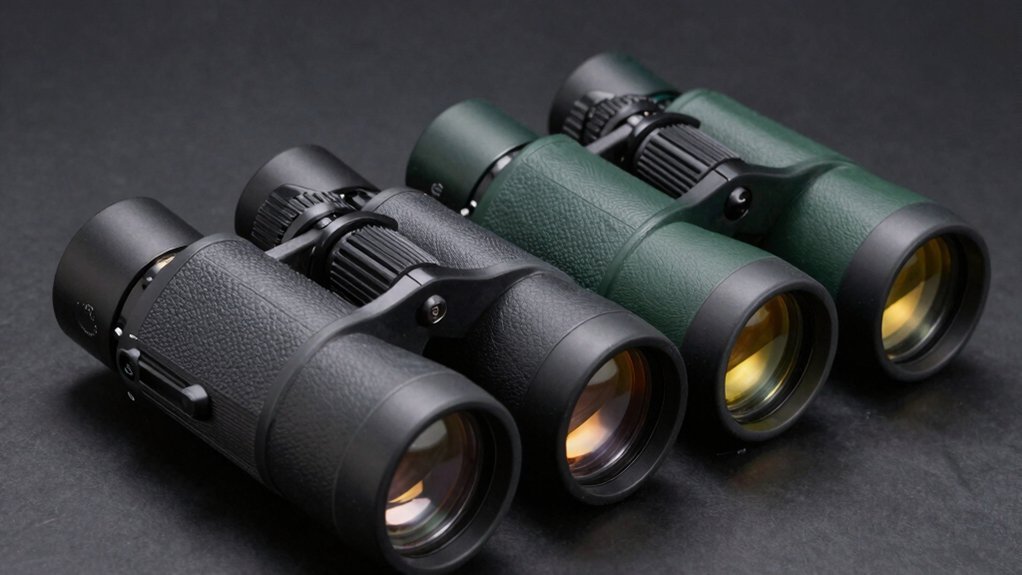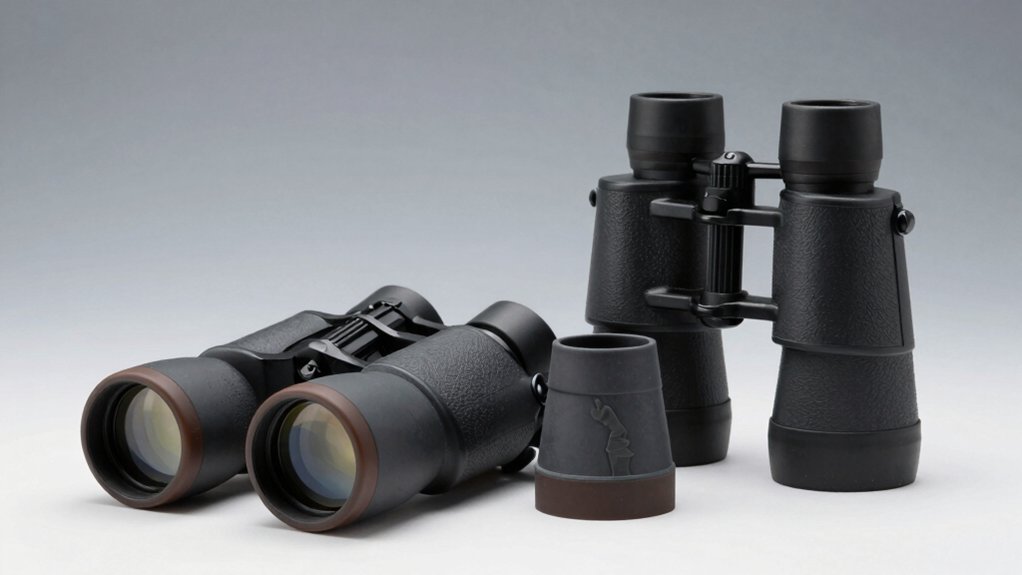For beginners exploring the night sky, these five apps are essential: Star Walk 2 offers interactive maps with AR overlays; SkyView uses your camera to identify celestial objects instantly; Star Chart provides access to 120,000 stars; Sky Tonight helps track astronomical events; and Night Sky connects across devices with an impressive database. Many offer free versions with basic features, while premium versions grant telescope controls and advanced planning tools. Discover how these digital companions can transform your stargazing experience.
Best Entry-Level Apps for Navigating the Night Sky

Wondering how to make sense of that vast canopy of stars above you? Several astronomy apps make this challenge manageable for amateur astronomers.
Star Walk 2 offers a “Visible Tonight” feature with an interactive map and AR overlays to help identify stars, plus a free version that includes ads.
Explore the cosmos with Star Walk 2’s interactive maps and AR technology, or try their ad-supported free version.
SkyView lets you point your camera at the night sky to instantly recognize celestial objects and provides event reminders.
Star Chart’s extensive database of 120,000 stars and 88 constellations uses GPS for accurate stargazing.
If you’re tracking celestial events, Sky Tonight’s trajectory feature is invaluable.
Apple users will appreciate Night Sky’s connected stargazing capabilities that sync across devices, with access to over 1.7 billion stars.
Each app transforms your smartphone into a powerful astronomical tool.
Augmented Reality Apps for Real-Time Star Identification
While traditional stargazing requires star charts and telescopes, augmented reality apps have revolutionized how new astronomers identify celestial objects. Popular options like SkyView and Star Walk 2 transform your smartphone into a powerful educational tool – simply point your camera at the night sky for real-time identification of stars, planets, and constellations.
These stargazing apps provide detailed information about celestial objects, including names, distances, and velocities. You’ll appreciate features like “Visible Tonight,” which helps you plan observations by highlighting observable celestial objects from your location.
Many apps also let you view the night sky at different times, aiding in preparation for upcoming astronomical events.
Perhaps most conveniently, these star maps work offline, making them perfect companions for stargazing adventures in remote areas with limited connectivity.
Free vs. Premium Astronomy Apps: What Beginners Really Need

With augmented reality making stargazing more accessible than ever, many newcomers face a common question: should you invest in premium astronomy apps or stick with free alternatives? Your decision should align with your astronomy goals.
| App Type | Features | Best For |
|---|---|---|
| Free (Star Chart) | Basic star maps, AR identification | Casual stargazing |
| Free (SkyView Lite) | Essential celestial bodies, ads | Learning basic astronomy |
| Premium (SkySafari Pro) | Expanded databases, telescope control | Serious astronomers |
| Premium (PhotoPills) | Advanced planning tools | Astrophotographers |
| Either | Educational resources | All beginners |
While free apps offer enough functionality to start exploring the night sky, you’ll eventually want premium features as your skills develop. Many beginners find free versions sufficient until they’re ready to tackle more complex astronomical observations.
Apps That Connect With Your First Telescope
Once you’ve invested in your first telescope, the right companion app can transform your stargazing experience from frustrating to fantastic.
Apps like SkySafari 7 Pro offer powerful telescope control features that sync your smartphone app with smart telescopes for precise targeting of celestial objects.
Sync your smartphone to the cosmos with telescope control apps for pinpoint celestial navigation.
If you own a Celestron telescope, their SkyPortal app enables remote control, making it easier to locate stars, planets, and deep-sky objects.
Apple users will appreciate Night Sky’s seamless integration and user-friendly interface for real-time celestial mapping.
Stellarium Mobile Plus combines an extensive database with telescope control features perfect for beginners.
Beyond just locating objects, these apps provide valuable educational resources and tutorials to help you master your equipment and deepen your understanding of what you’re seeing in the night sky.
Community-Based Apps for Learning and Sharing Observations

As you progress in your astronomical journey, community-based astronomy apps can elevate your stargazing from a solitary pursuit to a shared adventure. Platforms like Heavens-Above let you track satellites in real-time and share your observations with fellow enthusiasts.
For astrophotography lovers, AstroBin provides a space to showcase images and exchange techniques with others.
Night Sky app’s Connected Stargazing feature enables stargazing remotely with friends via SharePlay, bringing distant observers together under one virtual sky.
Amateur astronomers particularly appreciate SkySafari‘s social features, which allow you to share discoveries of fascinating celestial objects.
With over 40 million downloads of apps like SkyView, it’s clear that learning through shared experiences has become central to modern astronomy—transforming individual curiosity into collective exploration.
Frequently Asked Questions
Are Astronomy Apps Good for Beginners?
Yes, astronomy apps are excellent for beginners. They’ll help you identify stars easily through user-friendly interfaces, provide educational resources, and offer real-time tracking of celestial objects without requiring advanced knowledge or equipment.
What Do I Need to Start Stargazing?
To start stargazing, you’ll need a smartphone with astronomy apps, comfortable blanket or chair, binoculars or beginner telescope, and a journal for observations. Learning basic astronomical concepts will enhance your experience under the stars.
Do Stargazing Apps Teach About Astronomy?
Yes, stargazing apps definitely teach about astronomy. You’ll learn to identify celestial objects, understand astronomical events, and explore the universe through interactive features, detailed databases, and educational content they provide.
Is Stellarium Plus Worth It?
Yes, Stellarium Plus is worth it. You’ll get access to a massive star database, telescope control, and time travel features—all for just $2.99. It’s excellent for both beginners and experienced stargazers.
In Summary
You’re now equipped with the digital tools to begin your cosmic journey! Whether you’re identifying constellations through your phone’s camera or connecting your first telescope to an app, these programs transform stargazing from intimidating to accessible. Don’t worry about spending money right away—many free options offer everything you’ll need as a beginner. Download one tonight, step outside, and let technology guide your eyes to wonders you’ve never noticed before.





Leave a Reply